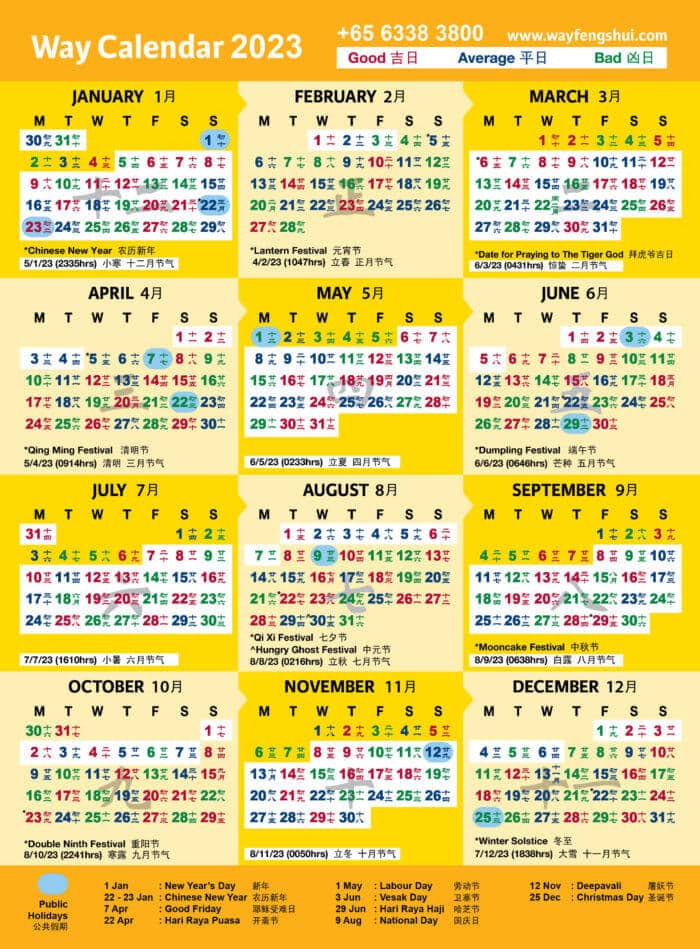Chinese New Year 2023 will fall on Sunday, January 22nd, 2023, starting a year of the Rabbit. As a public holiday, Chinese people will get 7 days off from work from January 21st to January 27th in 2023.
RELATED: Nepo babies – What are they and who are the big-name examples?
What is the Chinese New Year 2023 Animal? — Rabbit
Chinese New Year 2023 is a Year of the Rabbit, more specifically, Water Rabbit, starting from January 22nd, 2023, and lasting until February 9th, 2024.
Recent/upcoming years of the Rabbit are 1951, 1963, 1975, 1987, 1999, 2011, 2023, and 2035. If you were born in one of the years, then you are a Rabbit. You will experience your zodiac birth sign year (benmingnian) in 2023, which is considered bad luck.
The 12 animals of the Chinese zodiac are Rat, Ox, Tiger, Rabbit, Dragon, Snake, Horse, Goat, Monkey, Rooster, Dog, and Pig.
You can use our free Chinese zodiac sign calculator tool to find your zodiac animal sign and check your horoscope in 2023 on our page Chinese zodiac.
Why Does Chinese New Year Date Change Every Year?
The date is decided by the Chinese Lunar Calendar, which is based on the cycles of the moon and sun and is generally 21–51 days behind the Gregorian (internationally-used) calendar.
The date of Chinese New Year changes every year, but it always falls between January 21st and February 20th. The day of Chinese New Year is a new moon day, usually the second after the winter solstice.
How Long is the Chinese New Year Holiday?
China’s public holiday for Lunar New Year is 7 days, from Chinese New Year’s Eve to the sixth day of the lunar calendar new year.
Offices, banks, factories, shops, and most non-essential services will close doors for a week’s holiday. Hotels and large retail outlets stay open and may even be busier than usual! School holidays are four weeks long and migrant workers abandon their factory and construction jobs for weeks to return home.
Holidays in Hong Kong, Macao, and other Asian countries such as Malaysia, Singapore, Vietnam, and Korea are 1 to 3 days.
How Long is Chinese New Year 2023?
Celebrations of Chinese New Year traditionally last for 16 days, starting from Chinese New Year’s Eve to the Lantern Festival. The most notable dates of the Lunar New Year 2023 are these three days:
- Chinese New Year’s Eve on January 21st, 2023
- Chinese New Year’s Day on January 22nd, 2023
- The Lantern Festival on February 5th, 2023
Each day of the 16-day-long festival has a name, and usually an assigned purpose or meaning. Below is a table of all the important dates and their meanings.
| Solar Date (2023) | Lunar Date | Title | Purpose / Meaning |
|---|---|---|---|
| Jan. 21st | 12th month, 30th day 除夕 (Chúxì) | New Year’s Eve (除夕 Chúxì) | The most important celebration, includes the family reunion dinner, and staying up until midnight. |
| Jan. 22nd | 1st month, 1st day 初一 (Chūyī) | New Year’s Day 初一 (Chūyī) | A day for visiting/greeting family and relatives, giving presents, and visiting ancestors’ graves. |
| Jan. 23rd | 1st month, 2nd day 初二 (Chū’èr) | In-Law’s Day (迎婿日 Yíngxùrì, or 开年 Kāinián) | Married women visit their parents with their husbands and children. |
| Jan. 24th | 1st month, 3rd day 初三 (Chūsān) | Day of the Rat (鼠日 Shǔrì) | An ominous day, common to stay at home and rest with family, play games. |
| Jan. 25th | 1st month, 4th day 初四 (Chūsì) | Day of the Sheep (羊日 Yángrì) | An auspicious day, for prayer and giving offerings, or going to temples or fortune-tellers. |
| Jan. 26th | 1st month, 5th day 初五 (Chūwǔ) | Break Five (破五 Pòwǔ) | Commonly accepted as the day when taboos (from previous days) can be broken. |
| Jan. 27th | 1st month, 6th day 初六 (Chūliù) | Day of the Horse (马日 Mǎrì) | Believed to be the best day to get rid of old, unwanted things. Also an acceptable day to resume labor. |
| Jan. 28th | 1st month, 7th day 初七 (Chūqī) | Day of Mankind (人日 Rénrì) | Believed to be the day people were created. Encouraged to spend out in nature. |
| Jan. 29th | 1st month, 8th day 初八 (Chūbā) | Day of the Grain (谷日节 Gǔrìjié) | Good weather on this day will symbolize good crops for the year. Many families will have a second ‘mini’ reunion dinner. |
| Jan. 30th | 1st month, 9th day 初九 (Chūjiǔ) | Providence Health (天公生 Tiāngōngshēng) | The ‘Jade Emperor’s birthday, giving offerings, lighting incense, and setting off firecrackers. |
| Jan. 31st | 1st month, 10th day 初十 (Chūshí) | Stone Festival (石头节 Shítoujié) | The birthday of the ‘god stone’, similar to the previous day’s rituals. |
| Feb, 1st | 1st month, 11th day 初十一 (Chūshíyī) | Son-in-Law Day (子婿日 Zǐxùrì) | Fathers are expected to ‘entertain’ or treat their sons-in-law on this day. |
| Feb. 2nd – 4th | 1st month, 12th – 14th day 初十二 – 初十四 (Chūshí’èr – Chūshísì) | Lantern Day Preparations | Preparations for the lantern festival: cooking, making lanterns, etc. |
| Feb. 5th | 1st month, 15th day 初十五 (Chūshíwǔ) | Lantern Festival (元宵节 Yuánxiāojié) | Marks the end of the festival. Lanterns are lit and hung or flown, people watch dragon dances in the streets, and children answer lantern riddles. |













